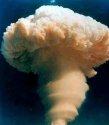SinoSoldier
Colonel
A very interesting read concerning a near-accident involving a Q-5 attack aircraft and a hydrogen bomb.
Video of the test:
Photographs of the involved aircraft:


Photograph of the KB-1 thermonuclear weapon, which was deployed by the Q-5 jet:

Photograph of the successful 1972 test:

Recalling the H-Bomb that Almost Backfired
Yang Guoxiang, one of China's top test pilots, tells the story.
When your assignment is to drop a live nuclear bomb, you’d better not return to base with it. But that’s just what happened in 1971 to Yang Guoxiang, a pilot with the People’s Liberation Army Air Force, who told his harrowing tale to Bob Bergin, a former U.S. Foreign Service officer who writes about the aviation history of Southeast Asia and China. Bergin interviewed Yang in Kunming, China, in early 2009, with the assistance of interpreter Zhao Gang, an instructor at Yunnan University
(Click link to read more)
Video of the test:
Photographs of the involved aircraft:


Photograph of the KB-1 thermonuclear weapon, which was deployed by the Q-5 jet:

Photograph of the successful 1972 test:

Last edited:
